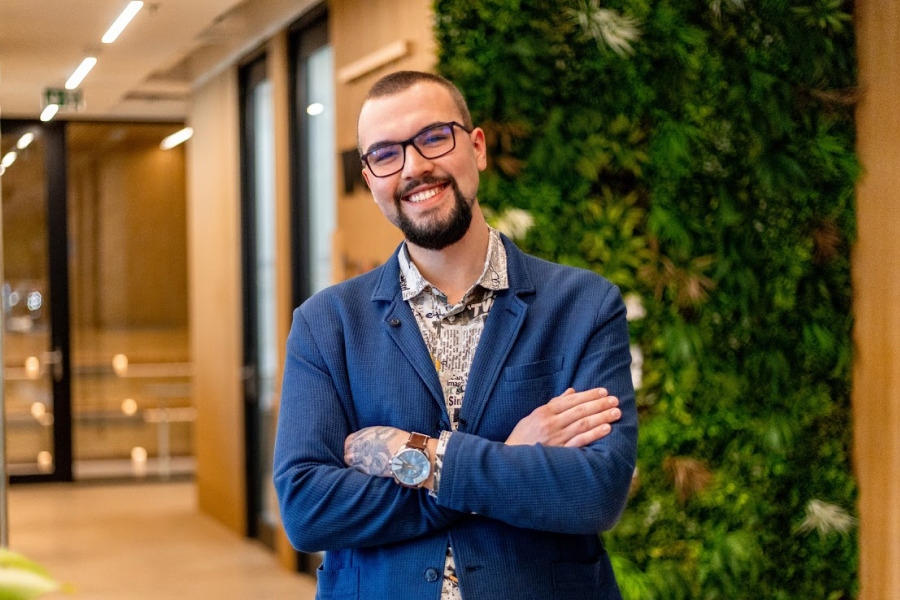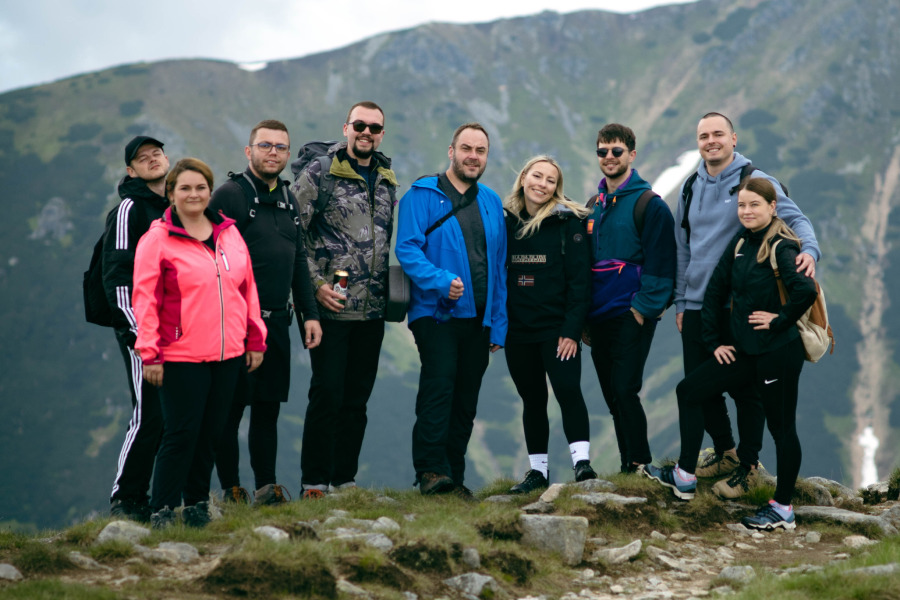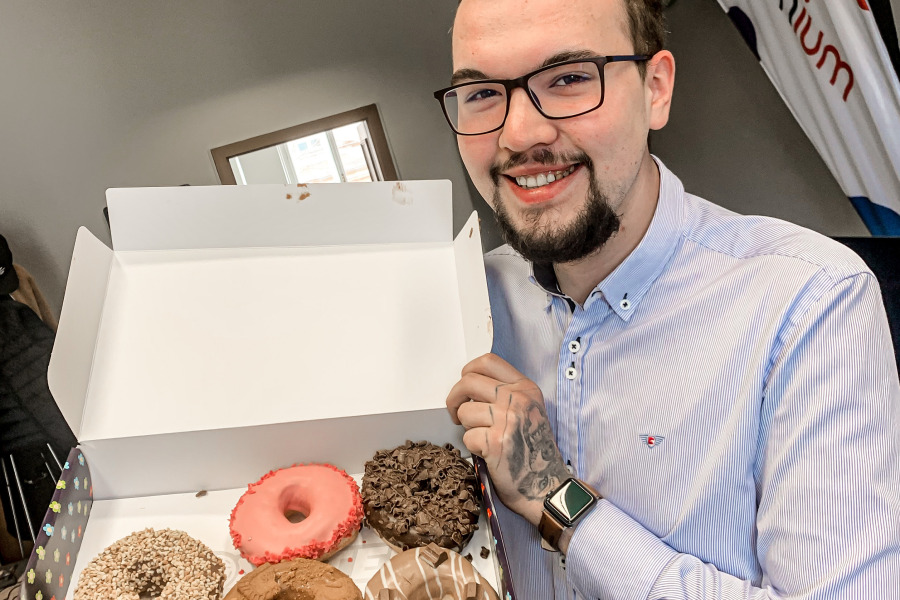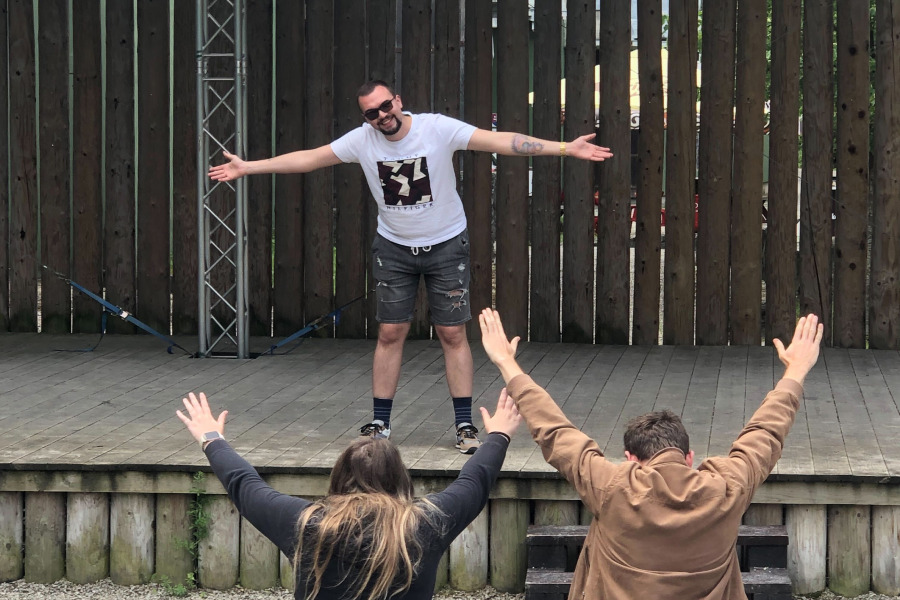From the first leaflet to business success: The story of Sebastian Fešar at Sloneek 🐘

Sloneek presents himself – Nr.2 Sebastian Fešar
Sebastian is 🚀 , who has shot our sales into remarkable numbers with his arrival. He stands out for his naturalness, pro-client approach and team spirit. Our first team building together will always be in our memories!
What brought you to Sloneek?
Well, it’s been a thorny road. Before I joined Sloneek, I worked at a start-up, but we didn’t do very well. So I started searching intensively for ways to move forward. Because I used to encounter Milan Rataj and Vašek Martin at conferences around that time, spark began to fly between us.
While sending out my CVs, I was being persuaded by Radim, who had joined the Sloneek marketing department, and also by the aforementioned Milan, and they planted a seed in me. Countless coffees, phone and video calls. I have to say it took quite a long time to convince me, but looking back a year later, I am very glad that I decided to go for Sloneek.
So Sloneek managed to win you over? 🙂
I’m having an incredible time here. There are great people and a great product, which is terribly important to me as a salesperson – to believe in the product. I confess that, given my previous experience, I was concerned about this. But like I said, I would never change my decision. The fact that I didn’t go corporate and joined Sloneek instead is something I will never regret.
Sebastian and sales. How did it happen?
When I was 16 years old, I had a part-time job handing out leaflets and collecting responses to questionnaires on the street. Thanks to that, I started getting better at communication with complete strangers. I am no stranger to this way of communicating; in fact I quite enjoy it. Maybe because it’s such a challenge. Of course, the results were not immediate, and I had to work my way up to them. A friend and I used to give each other micro-challenges, like approaching someone on the street and asking them how they were doing for a hundred crowns – a bit hard core, but it was great practice.
Then, as part of another part-time job, I got into brewing coffee. That’s where I started to build a group of customers who were happy to return again and again. Nowadays, I’d call it networking.
And your actual first experience with sales?
I got my first real sales opportunity six years ago in a Belgian company. A sales manager was leaving and my ex-girlfriend who worked there thought I might give it a try. I was interviewed by the owner of the company in a pub over a drink. A little strange from today’s perspective.
You mentioned that you placed wagers at work. I assume the sales staff at Sloneek ale take bets…
I don’t really like betting, because as I like to say – business is sometimes like looking into a crystal ball. You never really know how it’s going to turn out. If you don’t have a signed contract and the money in your account, the deal didn’t go through. I admit, however, that betting can provide a certain motivation to get things done. When I make a bet, I try to win. I haven’t won often, but I always try to overcome my limits.
What skills do you think a salesman should have?
A good salesman should be able to listen. That’s the most important thing. After that, they should be able to use common sense, not to look for unnecessary complexities. They should be able to think fast, react quickly – in a second, without any sign of uncertainty. To do that, you need to have communication skills at least at the level of being able to speak coherently and convey an idea clearly.
And last but not least, a salesman must be positive. A salesman with a smile can put you in a good mood. They must also be able to give advice without it being an obvious sales pitch. You can’t break the customer at any cost. Sometimes it’s better to say – look, my solution is probably not right for you. It sounds a little silly coming from me, I’m still learning.
What was your biggest work fail?
There have been many professional fails, naturally. Just recently, I just forgot to get a contract signed, so I had to chase down the customer for two months so we could issue an invoice.
The worst thing is to think “it’ll be fine”. And it’s not fine. Then, of course, there are both personal and corporate consequences – a lost contract or a client leaving. You will probably always make mistakes, but it seems to me that the most important thing is to learn from mistakes and not repeat them.
What do you think makes Sloneek unique?
When I tell my peers about Sloneek, I particularly feel the uniqueness of our company culture. I think it’s something absolutely amazing – the way we treat each other, the way we communicate, the fact that we can say things to each other directly when we have a problem and so on.
We all (or at least most of us) feel comfortable here, which is why it can work the way it does.
And from a product perspective? There’s more to it than that, of course. But I think the key is working with clients on development. We don’t build the product any which way, but we collect feedback from users that we continue to work with, not only in development.
The least popular question from recruiters – where do you see yourself in 5 years?
I probably won’t make it as director of the globe anymore, as I hear the job’s been filled. 🙂 I am a person who likes to pass on what he knows. When I had subordinates in my team, I always tried to motivate them, to help them, to be at the centre of the team while never falling out of sales activity as such. So if there’s an opportunity to do that at Sloneek, I’ll be very happy.
What do you do when you’re not working?
Lately I’ve taken a liking to chilling out while gaming. Right now it’s League of Legends. But I’ve also returned to writing lyrics and music. For now, the writing goes in a drawer. When my friend and I release it, I hope it will be listenable.
What style is it?
Trap Rap
So you’ve converted the Nedvěd brothers to rap? 🙂
(Laughs) No, but it’s kind of an offshoot of rap. It’s a way for me to blow off steam. I like to work things out in my head and then put it all down on paper.








